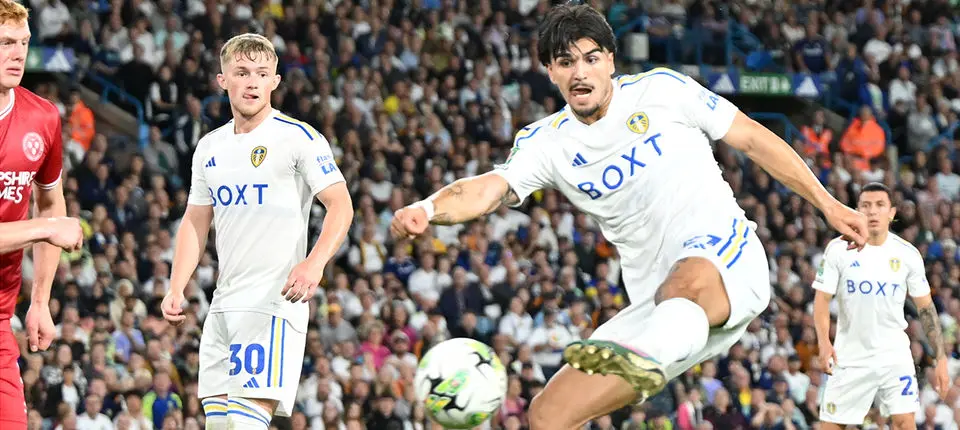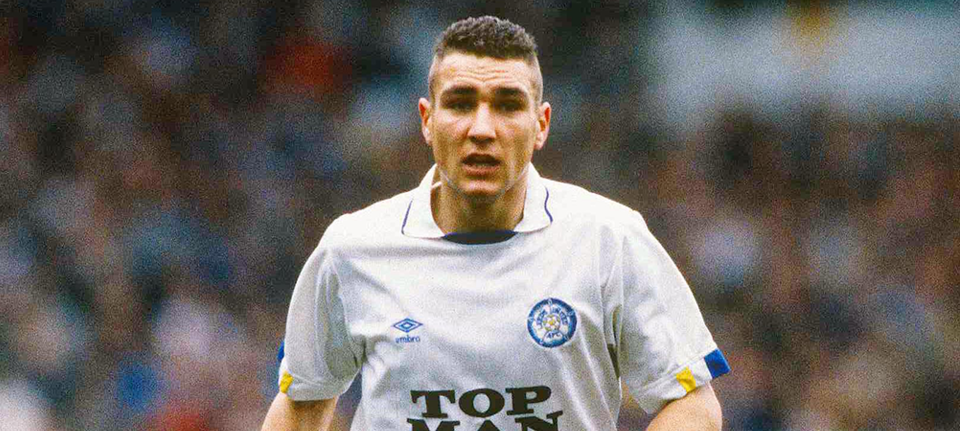In his latest column for leedsunited.com, lifelong supporter Jon Howe looks on the history of Leeds United v Brighton & Hove Albion, ahead of Saturday's clash at Elland Road.
Howe is the author of two books on the club, ‘The Only Place For Us: An A-Z History of Elland Road’ - which has been updated as a new version for 2021 - and ‘All White: Leeds United’s 100 Greatest Players’ in 2012.
When Pascal Struijk forced home his back-post header against Brighton & Hove Albion at Elland Road last May to secure an unlikely-looking 1-1 draw, it changed the course of Leeds United’s history. Every goal scored does in its own little way, but this one more than most. It gave Leeds some crucial impetus and belief going into that crazy final game at Brentford and earned a rare and precious point against Brighton at Elland Road, something which, going into this weekend’s crucial Premier League clash, Leeds will be hoping proves a catalyst for improvement.
As a material gain, the point Pascal salvaged in the dying seconds of our final home game didn’t actually matter in the end, but it halted a run of demoralising defeats, changed the mentality and gave the players something more than blind hope at a time when we would have settled for anything to cling to. Who knows what would have happened if the Leeds players had spent the week pre-Brentford on the back of a fourth consecutive defeat? And in terms of our recent record against Brighton & Hove Albion, Joffy’s penalty box trickery and Pascal’s sheer resolve in climbing above the defender and nodding the cross home, upset the applecart and reversed the received wisdom when nobody expected it. This was a season and a game Leeds weren’t looking like getting anything from, until that moment.
Every club has a bogey team in some form or another, but Leeds seem to have more than their fair share. The sad passing of BBC commentator John Motson recently revived his famous introduction about Don Revie’s Leeds United in the ‘Glory Years’ video, describing them as providing their own version of football’s ‘ABC’: Arrogance, Belligerence and Class. Another version, which perhaps more comprehensively covers Leeds United’s 103-year history, would be the teams Leeds have routinely struggled against over the years and opponents you view on the upcoming fixture list with withering inevitability and an overwhelming portent of dread; Arsenal, Brighton and Cardiff.
We haven’t beaten Arsenal in 13 league and cup games since Mark Viduka’s famous winner at Highbury in 2003, and given the nature of some of those games, it’s overdue to the point of driving us to madness. And while our recent record against Cardiff has of course improved, we went 17 games over 31 years up to 2015 without beating them, home or away. Millwall away is similarly cursed as a fixture, but at least that’s only away, while we’ve only beaten Manchester United five times in 42 attempts since our 1990 promotion.
There’s a fine line between thinking a particular club has an Indian curse over you, and you simply struggling to beat them because, traditionally, they are actually really good, but Brighton’s hex over us doesn’t quite fall into that category because it transcends eras and falls into the time when we were both mediocre Championship clubs. In fact, any Brighton historian might identify Leeds United as being synonymous with the fork in the road juncture and the steady incline in fortunes which has transformed their club.
In our three seasons in League One we played Brighton six times, winning four and drawing the other two. In fact we won all three games at the wonderful and sadly-missed Withdean Stadium (Brighton fans’ opinions might differ) in an ascending order of 1-0, 2-0 and 3-0. That’s a statistical trend you would love to continue, but as it is, since Brighton moved to their new Amex Stadium in 2011 and effectively became a new club in all but name, Leeds have played there nine times and not won once.
I often think about what makes an opponent a bogey team; an often illogically feared opponent with little foundation to the view that it’s a game you just don’t fancy. If it were the same players or managers who trudged down to the south coast each season with the same recurring anxieties in their recent memory, you could understand it, but that Leeds United crime sheet at the Amex Stadium has been presided over by Simon Grayson, Neil Warnock, Brian McDermott, Neil Redfearn, Steve Evans, Garry Monk, Marcelo Bielsa and Jesse Marsch. And God knows how many different players. And if that winless record away at Brighton wasn’t bad enough, we haven’t even scored in our last seven visits. The last goal Leeds bagged there was a 65th minute equaliser by Michael Brown in 2012, and if Brighton fans think their club has been totally transformed over the last ten years, then perhaps we can look at that sorry statistic and say the same.
By now you probably want some good news, and that comes in the fact that Leeds have fared slightly better against Brighton at Elland Road. Since the League One years we have faced Brighton eight times at home; winning two, drawing one and losing five. The two wins were the opening day 2-1 victory in 2013 when we were “up all night for Luke Murphy” and the Chris Wood double on a Saturday evening in March 2017, which felt like a statement victory until it turned out it wasn’t.
Other than that, it’s relatively slim pickings against our friends from Falmer, perhaps best summarised by the general opinion that Graham Potter’s Brighton seemed to get the tactical measure of Bielsa’s Leeds like no other team did, and yet nobody could quite explain why or how. But the reason I mention all this, and yes, thankfully there is one, is that Struijk’s last-minute equaliser last May felt like a turning point in this moribund tradition, even if we conveniently ignore our customary abject performance at the Amex Stadium back in August.
Joyful, euphoric moments against Brighton are few and far between in our recent history, and we might as well accept that we may never score against them in an away fixture ever again, at least until they choose to make the irrational decision of moving back to a local athletics stadium with temporary seating. As propelling a bogey team curse into oblivion goes, however, Struijk’s header acted like shovelling caustic soda down a blocked drain and may at least have released the mental chains which, for whatever reason, have restricted Leeds teams against Brighton at Elland Road, and if so that would be a very timely form of liberation.
And if we’re talking about bogey teams, then it’s only fair that we look at the flipside, and I mention that our 79% win record against still-to-play Bournemouth is our highest historical percentage against a team we’ve played more than ten times throughout our history; winning 11 of our 14 games against them and only losing once. We’ve also got a decent Premier League record against Tottenham at home and West Ham away, but that’s probably enough about curses, spells and superstition for now.
On any given day, any team can beat another, and if we look back through Leeds United’s history you could probably make a case for every team being a strangely immovable nemesis at one time or another, it certainly feels like it. The point is, those trends change eventually and our records against those teams improve, and if we earn something valuable from Saturday’s Elland Road clash with Brighton, we might remember to thank Pascal Struijk for it in particular.




